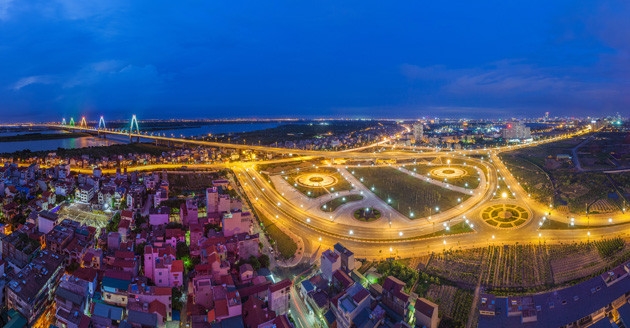In an interview with a VNA correspondent in Buenos Aires, Fiorda stressed that Vietnam is moving beyond the post-Doi moi (renewal) phase by building a more efficient state, oriented towards short- and medium-term goals. He praised Vietnam’s strong orientation in mobilizing private capital and large-scale investment while adjusting its development model to consolidate its status as an upper-middle-income country on the path toward becoming a developed nation.
    |
 |
|
Hanoi seen from above (Photo for illustration) |
On institutional reform, he noted that streamlining the state apparatus is essential. The outcome of this process, he said, will be reflected at the upcoming National Congress of the Communist Party of Vietnam – a major political event that will review the five-year term, elect new leadership, and set the country’s development vision to 2045, when Vietnam marks its centenary of independence.
According to Fiorda, Vietnam’s central target in this phase is to reach high-income status, or at least upper-middle income. He underlined that the country’s most significant advantage is consistency in strategic policymaking – a factor that has enabled its impressive rise during nearly four decades of Doi moi. He highlighted Vietnam’s foundational principles such as recognition of workers’ rights, equality, collectivism, and solidarity – rooted even before the Communist Party’s founding in 1930 – now serving as drivers for growth and integration.
As for opportunities and challenges, Fiorda stressed that the country must sustain rapid growth while ensuring fairness, avoiding concentration of benefits in a few sectors or groups. Every citizen, he said, should be given the opportunity to thrive – to own a home, access quality healthcare and education, increase incomes, and enjoy goods and services that meet social needs.
He noted that Vietnam is not shying away from these challenges but is proactively addressing them. The country has become one of the world’s most active signatories of free trade agreements, including with major capitalist economies, while still maintaining its ideological foundations. Its ability to adapt to global rules while safeguarding national interests, the expert argued, is a strength that will help realize its long-term goals.
Against a backdrop of global uncertainties and digital transformation, Fiorda expressed his admiration for the Vietnamese spirit of self-reliance, confidence, resilience, and national pride.
He affirmed that the Vietnamese people, who have overcome poverty and wars through unity, will continue to be the driving force behind upcoming transformations. Public trust in the Party’s leadership, coupled with enduring solidarity, will ensure the nation advances steadily into a new era.
Source: VNA